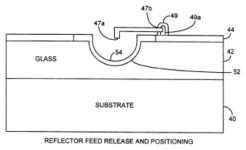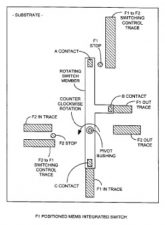David M. Lederman (Ph.D. 1966, EP)
Artificial Heart
CEO, Abiomed
“The AbioCor device itself is totally implantable. An external tool – a coil – transfers battery power through the skin and into the device. A full charge can last 30 to 40 minutes. The external portion can also be plugged into an electric outlet if the patient remains in one area.” -www.masshightech.com
Dr. Lederman has 6 U.S. patents relating to the artificial heart:
- US6508756 (2003) Passive cardiac assistance device, with Robert T. V. Kung,, Meir Rosenberg
- US6224540 (2001) Passive girdle for heart ventricle for therapeutic aid to patients having ventricular dilatation, with Robert T. V. Kung
- US6210318 (2001) Stented balloon pump system and method for using same
- US5800528 (1998) Passive girdle for heart ventricle for therapeutic aid to patients having ventricular dilatation, with Robert T. V. Kung
- US4902272 (1990) Intra-arterial cardiac support system, with Frederic L. Milder, Robert T. V. Kung, Param L. Singh
- US4888009 (1989) Prosthetic heart valve, with Param I. Singh, Clair L. Strohl, Jr.


Robert S. Langer (B.S. 1970, ChemE)
Biomedical Applications of Polymers
After Cornell, Robert Langer graduated from MIT with a Ph.D. in 1974. He is now the Kenneth J. Germeshausen Professor of Chemical and Biomedical Engineering at the Massachusetts Institute of Technology.
One of history’s most prolific inventors in medicine, Dr. Langer’s 500 issued and pending patents have been licensed or sublicensed to over 100 pharmaceutical, chemical, biotechnology and medical device companies; a number of these companies were launched on the basis of these patent licenses. Langer pioneered the field of controlled drug delivery using biodegradable polymers. He was the first to engineer synthetic materials that allow for the precisely timed release of chemicals through surgical implants inserted directly within the diseased tissue. Langer’s controlled delivery techniques have been used to treat brain cancer right at the source instead of through damaging chemotherapy. Through Langer’s innovations, the controlled drug delivery industry has become a multibillion-dollar-a-year business that prolongs and saves thousands of lives.
Dr. Langer’s most recent work is with tissue engineering and human tissue regeneration. His goal is to engineer a synthetic framework on which to grow human cells.
He has patents in magnetically controlled drug-release implants, transdermal ultrasound drug delivery, 3D polymer scaffolds for growing human tissue, microchip drug delivery, and biocompatible shape-memory polymers that return to predetermined forms once inside the body.
Dr. Langer is the only active member of all three US National Academies–Engineering, Sciences, and Medicine.

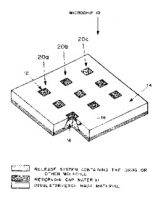
Jeffrey C. Hawkins (B.S.1979, EE)
Former founder of Palm Computing
Current CEO, Handspring
57 Patents Relating to Handheld Computing Worldwide
Mr. Hawkins is also founder and director of the non-profit Redwood Neuroscience Institute, a scientific research institute working on theories and mathematical models of brain function (www.rni.org).
Selected Patents:
- US20030046528 (application) Method and apparatus for interacting with a portable computer system, with Robert Yuji Haitani
- US6516202 (2003) Mobile computer system designed for wireless communication expansion, with Jerome C. Tu, Robert Y. Haitani, Christie L. Cadwell, Karl A. Townsend
- USD467235 (2002) Hand-held device with handwriting area, with Peter N. Skillman, Michael A. Yurochko
- US6493464 (2002) Multiple pen stroke character set and handwriting recognition system with immediate response, with Joseph Kahn Sipher, Ron Marianetti II
- USD466877 (2002) Hand-held device with keyboard, with Peter N. Skillman
- USD466502 (2002) Flip door for personal digital assistant, with Peter Skillman, Melissa Trott, Martin Bone
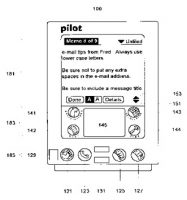
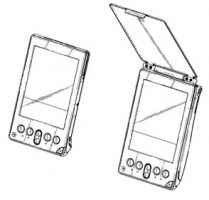
Jerry M. Woodall (Ph.D. 1982, EE)
Pioneer in Research and Development of Compound Semiconductor Materials and Devices
Received National Medal of Technology award at White House, 2002.
Currently C. Baldwin Sawyer Professor of Electrical Engineering, Yale University.
Fully half of the world’s annual sales of compound semiconductor components are based on Woodall’s pioneering research in that area, and he is the inventor of many electronic and optoelectronic devices commonly seen in modern life, including the red light-emitting diodes (LEDs) used in indicators and stop lights; the infrared LEDs used in CD players, TV remote controls and computer networks; the high-speed transistors used in cell phones and satellites; and high-efficiency solar cells used to power satellites.
He built the first high-purity single crystals of gallium arsenide, enabling the first definitive measurements of carrier velocity versus electric field relationships, as well as gallium arsenide crystals used for the first non-supercooled injection laser. He and Hans Rupprecht pioneered the liquid-phase epitaxial growth of high efficiency infrared LEDs, and gallium aluminum arsenide (GaAlAs), which led to his most important research contribution so far: the first working gallium aluminum arsenide/gallium arsenide heterojunction, the interface between two different semiconductor materials. This remains the world’s most important compound semiconductor heterojunction.
Dr. Woodall co-founded LightSpin Technologies, Inc., a high technology startup company, and serves as its Chief Science Officer. He hold 67 patents.
Selected Patents:
- US4460910 (1984) Heterojunction semiconductor, Barbara A. Chappell, Terry I. Chappell
- US4477721 (1984) Electro-optic signal conversion, with Terry I. Chappell, Dieter W. Pohl
- US4379005 (1983) Semiconductor device fabrication, with Harold J. Hovel
- US 4316048 (1982) Annealing of ion implanted III-V compounds in the presence of another III-V, with Hans S. Rupprecht
- US4352117 (1982) Electron source, with Cuomo; Jerome J. Cuomo, Russell W Dreyfus
- US4358291 (1982) Solid state renewable energy supply, with Jerome J. Cuomo
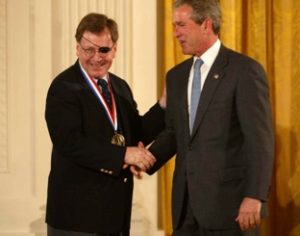
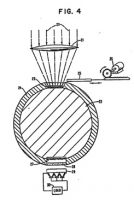
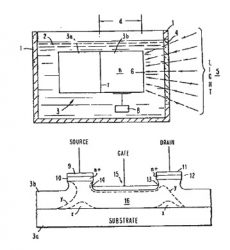
David F. Welch (Ph.D. 1985, EE)
Pioneer in Semiconductor Laser and Optoelectronic Technology
David Welch, Ph.D. is the Chief Technical Officer and co-founder of Infinera, a fiber optic systems company founded in 2001. Infinera is focused on creating new strategic advantages for customers through innovative and disruptive technologies.
Prior to this he was CTO and Vice President of Corporate Development for SDL where his responsibilities include overall technology direction and merger/acquisitions. Dr. Welch joined SDL, Inc. in 1985 as a research scientist and has also held positions of Vice President of R&D and Vice President of the Systems Business Group. He has worked on the development of advanced optical technologies for fiber optic communications, and has published over 250 articles and authored over 50 patents.
Dr. Welch received his BSEE degree from The University of Delaware in 1981 and his Ph.D. degree from Cornell University in 1985.
Selected Patents:
- US6433920 (2002) Ramon-based utility optical amplifier, with Robert J. Lang, Edward C. Vail, Mehrdad Ziari
- US5392308 (1995) Semiconductor laser with integral spatial mode filter, with David G. Mehuys, Donald R. Scifres
- US5384797 (1995) Monolithic multi-wavelength laser diode array, with Robert G. Waarts, Jo S. Major, Ross D. Bringans, David K. Fork, G.A. Neville Connell, Robert L. Thornton



Allyson D. Yarbrough (M.S. 1985, Ph.D. 1988, ECE)
Micromachined Electronic and Electromechanical Systems
Allyson Yarbrough (B.S. EE, New Mexico State University, MS, Ph.D (both ECE) Cornell University), spent three years with Hewlett-Packard Company’s Network Measurement Division as a Product Marketing/Microwave Applications Engineer. In 1988, Dr. Yarbrough joined California State University, Los Angeles as an Associate Professor of Electrical Engineering. In 1989 she joined The Aerospace Corporation and has held numerous positions, each with more responsibility. Dr. Yarbrough is currently Principal Director, Electronics Engineering Subdivision. She is responsible for overseeing projects involving the full spectrum of space system electronics engineering from the microelectronic piece-part level to the level of systems and subsystems for launch vehicles and satellites. She holds 5 patents and has published extensively.
Selected Patents:
- US6238580 (2001) Method of HF vapor release of microstructures, with Robert C. Cole, Ruby E. Robertson
- US6072686 (2000) Micromachined rotating integrated switch
- US6045712 (2000) Micromachined reflector antenna method, with Samuel S. Osofsky, Ruby E. Robertson, Robert C. Cole
- US6008776 (1999) Micromachined monolithic reflector antenna system, with Samuel S. Osofsky, Ruby E. Robertson, Robert C. Cole
- US5525819 (1996) Microwave concentric mesfet with inherent electromagnetic shielding

